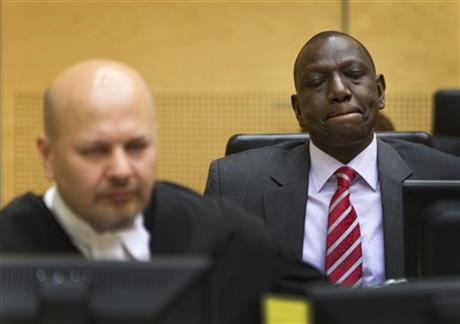
By MIKE CORDER
Kenya’s Deputy President William Ruto, right, awaits the start of his trial in the courtroom of the International Criminal Court (ICC) in The Hague, Netherlands, Tuesday, Sept. 10, 2013. At left defense counsel Karim Khan. The trial of Kenya’s deputy president has opened at the ICC on charges of orchestrating deadly violence in the aftermath of his country’s disputed 2007 election. Ruto and broadcaster Joshua Sang are both accused of murder, deportation and persecution. They insist they are innocent. (AP Photo//Michael Kooren, Pool)
THE HAGUE, Netherlands (AP) — Kenya’s Deputy President William Ruto went on trial Tuesday at the International Criminal Court for allegedly orchestrating deadly violence after his country’s disputed 2007 election.
The trial is a critical test for the ICC to demonstrate it can successfully prosecute an African leader. In November, Kenya’s president, Uhuru Kenyatta, will be tried on similar charges, meaning two top politicians from a nation seen as one of East Africa’s most stable democracies will be fighting charges in The Hague.
The court also has Ivory Coast’s former president Laurent Gbagbo in custody, charged with postelection violence, and has indicted Sudanese leader Omar al-Basir for genocide in Darfur.
While ousted leaders like Yugoslav strongman Slobodan Milosevic and former Liberian President Charles Taylor have faced international justice in the past, it is unprecedented for two such high-ranking suspects as Ruto and Kenyatta to stand trial at an international tribunal while still in office.
Ruto smiled confidently as blinds were raised between the courtroom and public gallery before Presiding Judge Chile Eboe-Osuji outlined the proceedings.
Ruto and broadcaster Joshua Sang are both accused of murder, deportation and persecution of political opponents in Kenya’s Rift Valley region in late 2007 and early 2008. Both men pleaded not guilty to all the charges.
Prosecutors have complained of widespread witness intimidation prior into the trial and some witnesses have refused to testify, throwing the strength of the case into question. The start of the trial was twice delayed to give defense attorneys more time to prepare.
Chief Prosecutor Fatou Bensouda told judges the intimidation of witnesses was so damaging it was “something of an achievement” that she was able to bring the case to trial.
A lawyer for victims of the violence, Wilfred Nderitu, warned of grave consequences of such widespread witness intimidation, saying it “could spell the death knell for this court and for international criminal justice.”
Bensouda told the court and a public gallery packed with Kenyan supporters of the two defendants that Ruto used networks within his Kalenjin tribe to target political opponents and members of the rival Kikuyu tribe.
Bensouda said more than 200 people were killed in the Rift Valley and 1,000 injured. Thousands more were forced from their homes.
“It is difficult to imagine the suffering or the terror of the men, women and children who were burned alive, hacked to death or chased from their homes by armed youths,” she said.
Bensouda called the attacks “a carefully planned, coordinated and executed campaign of violence” targeting Kikuyu supporters of the Party of National Unity.
While Ruto allegedly armed and organized the attackers, Sang is accused of using his popular radio show to whip up hatred against Kikuyu tribe members and even broadcast coded instructions to direct attackers to their targets.
Ruto’s lawyer, Karim Khan, called the case against his client “a very clear and glaring conspiracy of lies” and accused prosecutors of failing to properly investigate the case.
“We say that there is a rotten underbelly of this case that the prosecutor has swallowed hook, line and sinker, indifferent to the truth,” he said.
While Kenyans once overwhelmingly supported the intervention of the ICC, opinion has turned against the international body, in part by the long passage of time.
Dozens of Kenyan lawmakers were in The Hague on Tuesday to show their support for Ruto and Sang.
“We want to vindicate our leaders and our nation,” said lawmaker Aden Duale.
Kenya’s parliament last week passed a voice vote motion to withdraw from the ICC. The vote is symbolic and non-binding; only Kenya’s government can decide to withdraw from the ICC. The parliament move will have no effect on the trials of Kenyatta and Ruto, who were on opposite sides of Kenya’s political divide in 2007 but joined forces to win on a joint ticket this year.
Across Africa, opponents accuse the court of bias against the continent. In more than a decade of work, the court has only indicted Africans. It does not have jurisdiction to intervene in the Syrian conflict because Damascus has not joined the court.
The chairman of the African Union earlier this year said ICC prosecutions “have degenerated into some kind of race hunt.”
Former United Nations Secretary-General Kofi Annan, who helped broker peace in Kenya in 2008, rejected that view in an opinion piece in The New York Times.
“These trials also do not reflect the court’s unfair targeting of Africa, as has been alleged,” he wrote. “Instead they are the first steps toward a sustainable peace that Kenyans want, deeply, and can only be assured of if their leaders are not above the law.”
In Naivasha, in the Rift Valley, where the most severe postelection violence occurred, the court proceedings were watched in hotel bars.
“We praise the ICC for taking the bold step to prosecute the high and the mighty and we hope that after years of suffering we shall get justice,” said Peter Okoth, a 40-year-old mechanic who said he was a victim of the post-vote violence.
____
Associated Press reporter Jason Straziuso in Nairobi, Kenya contributed to this report.



